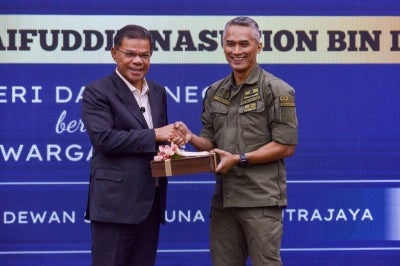Drug lords masquerade as a philanthropists, generous figures

Behind a charitable front, high-profile individuals or VIPs (very important persons) with titles like Datuk or Datuk Seri engage in solo drug distribution crimes to deceive the public's eyes.
Police also believed that the masterminds of drug syndicates also camouflaged themselves behind legitimate businesses.
This was among the modus operandi detected in the country involving those manipulating the people's trust.
Bukit Aman Narcotics Criminal Investigation Department (NCID) director Datuk Seri Mohd Kamarudin Md Din said these influential figures were found to be major contributors to various charity activities.
"Within the community, when these individuals' names are mentioned, the public will praise their generousity.
"So far, these individuals have acted independently and it did not involve any non-governmental organisations (NGOs) or political parties.
"However, the police did not rule out the possibility that they may become funders for any political party or the like," he told Sinar, recently.
Kamarudin said the NCID possessed an efficient and systematic information management system for conducting investigations into these syndicates.
He said the police through the department also collaborated closely with several external agencies to obtain information related to these drug syndicates.
Besides that, he said the department used all the relevant laws to conduct investigations and took drastic action against these syndicates, including asset seizures and arrests under preventive laws.
He said before the operations were executed, the police must gather fieldwork information.
This information, he said was crucial to confirm the involvement of these influential individuals in drug trafficking activities.
However, Kamarudin clarified that the arrests involving VIPs were rare occurrences, as the statistics for such arrests since 2020 were only three individuals.
Nevertheless, he said the NCID did not compromise with any party, including VIPs involved in purchasing cannabis seeds or cultivating marijuana plants.
"Do not ever disregard existing laws by providing various illogical excuses," he said.
Elaborating further on the modus operandi of drug smuggling syndicates, Kamarudin said the country's proximity to the drug-producing region known as the 'Golden Triangle', situated at the borders of Thailand, Myanmar and Laos was a major factor in drug entry into the country.
He noted that Malaysia's location, infrastructure and strong communication systems also positioned it as a transit country for drugs before they were smuggled into other countries.
The Malaysia-Thailand border, stretching approximately 576 kilometres (km) from Kuala Perlis to Pengkalan Kubur, Kelantan, has been identified as having hundreds of illegal entry points.
"Along the Kelantan-Thailand border, approximately 99km long, there are nearly 200 illegal entry points frequently utilised by smugglers to bring goods into the country, including drugs.
"Some of the drugs smuggled into the country are for transit purposes and are distributed in the local market to meet the increasing demand and needs of customers," he said.
Kamarudin emphasised that the high demand and market prices, reaching up to three times the original, made Malaysia a transit country for international drug smuggling.
"Heroin and methamphetamine (syabu) are drugs that are highly in demand outside the country, making Malaysia a transit point before they are being exported to third countries," he said.
He said various tactics have been used by international drug cartels to evade Malaysian border checkpoints through land, air and sea routes.
"Moreover, international drug cartels collaborate with local syndicates to ensure the smooth operation of drug smuggling from the producing country to a third country," he said.
Kamarudin said the NCID has intensified surveillance and enforcement, particularly at Malaysia's entry points, to curb drug smuggling.
"Through roadblocks and Op Benteng operations, we have successfully thwarted several major syndicates' attempts to smuggle drugs into the country," he said.
He added that the NCID remained committed to combating drug smuggling and aimed to break the chain between syndicates and middlemen.
"If the influx of drug supplies can be stopped, the demand from addicts becomes difficult to meet, ultimately cutting off their source of drugs," he said.
Kamarudin said the department has expanded intelligence networks with other agencies such as the Malaysian Armed Forces, the Royal Malaysian Customs Department and the Malaysian Immigration Department.
"Collaboration with these agencies is vital in executing legal actions and preventing drug smuggling while sharing information with authorities from other countries," he said.
INFORMATION
Breakdown of suspects arrested in Op Tapis Khas
- 6,106 dealers
- 35,978 addicts
- 2,556 wanted individuals
Breakdown of hotspot areas: 2,626 spots
- 902 Felda/Felcra/private plantation settlements
- 1,619 Low-Cost Housing Programme areas/housing projects/residences
- 241 illegal jetty/fishing village settlements
- 250 selected roadblocks
- 2,002 others
Total drug syndicates foiled from January to September 2023
- 245 syndicates
- 791 individuals
Total and value of drug seizures from January to September 2023
- Drugs 17,288.63 kg
- Ketum leaves 561,053.80 kg
- Ketum water 46,707.59 litres
- Liquid drugs 13,720 litres
Overall seizure value
- RM376.97 million
Total assets seized from syndicates from January to September 2023
- Seized asset value: RM86.42 million
- Confiscated asset value: RM8.25 million
Download Sinar Daily application.Click Here!














